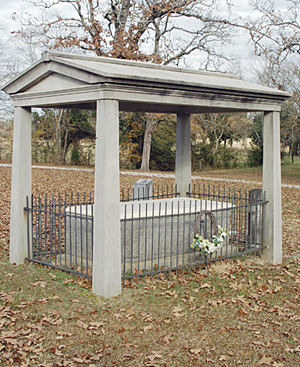For several years, the exit ramps off Interstate 20 between Columbia, S.C., and Augusta, Ga., summoned me. The legendary early American Baptist leader Luther Rice’s well-traveled, earthly life ended in 1836 in that part of rural South Carolina. Visiting his grave had always been of interest.
 Luther Rice was buried in rural South Carolina where his well-traveled life ended.
Luther Rice was buried in rural South Carolina where his well-traveled life ended.In October last year, the excuses ran out. Work in Columbia had been completed earlier than planned, and the return trip to Georgia was ahead of schedule. Published histories said Rice was buried in Edgefield, S.C. But against my masculine nature, I decided more specific directions would be helpful.
An Internet search, however, was hardly beneficial. Google didn’t know about the gravesite.
Apparently, county lines had been redrawn since Rice’s burial. It seemed the Pine Pleasant Baptist Church, previously in Edgefield County, was now in Saluda County. A call to the Saluda County Historical Society was answered by a kind woman, eager to assist.
Uncertain about the location of the church and grave, she promised to get back to me with more information and did. A South Carolina Baptist historian also pointed me in the right direction.
Should you choose to pay a visit yourself, here’s the scoop. Go to the lovely town of Saluda, then drive 8.7 miles toward Newberry on Highway 121.
On your left will be a historical marker paying tribute to Rice – but look carefully. Turn left at the marker. Drive past a large white home on the left and you will come to the church where Rice is buried in the front yard under a canopy.
Born in Northborough, Mass., in 1783, and raised a Congregationalist, Rice bought into the idea of believer’s baptism when he encountered British Baptists aboard a ship from America to India. Rejected by Indian officials upon arrival, he returned to America to build support for two other Congregationalists-turned-Baptists – Adoniram and Ann Judson – who took their missions zeal on to Burma.
Upon his return, Rice took head-on the challenge of convincing Baptists they could cooperate in mission endeavors while retaining their local church autonomy. It was not an easy sell, but Rice was rather convincing.
His leadership among Baptists also led to the formation of Columbian College, now George Washington University, and The Columbian Star, now the Georgia Baptist newspaper called The Christian Index.
In a sense, Luther Rice has become everybody’s Baptist. His name is embraced by a variety of organizations and institutions.
The administration building at the prestigious university in Washington, D.C., is named Rice Hall in honor of its founder. Donors making annual gifts of $1,000 or more to George Washington University are considered members of the Luther Rice Society.
Likewise, a seminary, now called a university, founded by conservative Southern Baptist pastors bears his name. Several prominent Southern Baptist pastors have their doctorates from the online or on-campus programs of Luther Rice Seminary that was founded in Florida and moved to Georgia.
A tireless proponent of missions and education, Rice traveled countless miles to visit influential Baptist leaders such as Francis Wayland in the Northeast and Richard Furman of South Carolina and Jesse Mercer of Georgia. He organized Baptists – something Baptists did not do well by intent.
“Since – 1816, I have traveled 6,600 miles, in populous and dreary portions of country, through wilderness and over rivers, across mountains and valleys, in heat and cold, by day and by night – in weariness, painfulness, fastings and loneliness,” said Rice in one report.
Rice endured much on behalf of Baptist missions, education and communications. He never married and expressed his loneliness at times. A cloud of distrust hung over him for a while when some criticized his handling of funds.
However, it was reported that his last act before death was asking friends in South Carolina to sell his horse and buggy and send the proceeds to the college in Washington. His earthly journey had come to an end on Sept. 25, 1836, at age 53, and he was buried in the South Carolina soil near where he died.
“He did not belong to South Carolina anymore than he belonged to Virginia or his native Massachusetts or to any other of the Eastern Seaboard states. He belonged to all Baptists,” historian Fred Anderson of Richmond, Va., once observed. “Luther Rice, more than any other single individual, rallied the scattered Baptist people into a denominational consciousness, a dedication to missions and a determination to develop an educated clergy.”
Such a person deserves a detoured visit off the interstate, no matter what kind of Baptist you are.